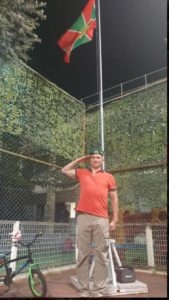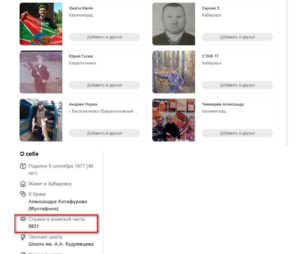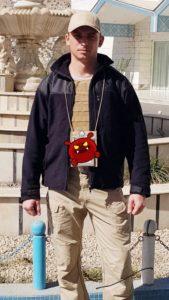Dmitry Khmelnitsky
Boris Demash
Updated: At the time we published our article on the Cyprus spy scandal involving expelled Russian «plainclothes journalist» Gasyuk and Russian «plainclothes diplomat» Doynikov, we did not know all the details of the story.
Today, additional details of those events have come to our attention. Unfortunately, we cannot report everything that we have learned, as it may jeopardize the source of the information.
As it turned out, the FSB officer, Danil Dojnikov, acting under diplomatic cover on the territory of the Republic of Cyprus, who accompanied Gasiuk at the time of his arrest, was working under diplomatic cover not only in Tajikistan, as described in the article, but also in Afghanistan and Jordan. In all these countries, Dojnikov had a special interest in and surveillance of certain targets associated with one small democratic country. The counterintelligence of this small democratic country detected Dojnikov’s increased interest in its facilities, especially in Amman, and identified him as an FSB officer.
Having appeared in Cyprus, Doinikov immediately fell under the «guardianship» of the special services of a small democratic country with its facilities on the island. Very soon it turned out that Doinikov was engaged in espionage together with another Russian spy masquerading as a journalist, Gasyuk. Together they were conducting surveillance and gathering information on several objects and persons on the island. One of the objects of their close surveillance was a house in Limassol, where, as it turned out, lived the family of a high-ranking Ukrainian official. When it became clear to the local authorities and their partners from democratic countries that Gasiuk and Doinikov were preparing for actions against the family members of the Ukrainian official, which would entail the most tragic consequences for them, it was decided to detain and expel Gasiuk. At the same time, the family of the Ukrainian official left Cyprus and is now safe. It should be emphasized here that Gasiuk was not only following the Ukrainian family. The Cypriot authorities had many reasons to send him home under escort. Surveillance and preparations to attack Ukrainians who had taken refuge from Russian aggression in Cyprus were only one of the main motives for Gasiuk’s arrest and expulsion, among many others. We will publish the rest of the details of the spy scandal involving Gasyuk and Doynikov as soon as possible.
On October fifth, 2023, a diplomatic scandal broke out in Cyprus. Rossiyskaya Gazeta correspondent Alexander Gasyuk, who was sitting in a car outside the house in Nicosia where he lived, was arrested by officers of the Cyprus police. The journalist was taken out of the car, handcuffed and put into a service vehicle. When the car moved from the place on its hood rushed a nearby employee of the Russian Embassy Dmitry Dvoinikov (so he was named in a number of Russian media), and lay on it a few dozen meters, after which he was also detained.
As it turned out from the report of the Cypriot TV channel AlphaNews, Gasyuk’s temporary residence permit was canceled back in September «for security reasons» and he was asked to leave Cyprus. Appeals by Gasyuk and the Russian Embassy to the Cypriot Foreign Ministry with protests had no effect. According to Gasyuk, the Cypriot security services injured his hand during the arrest. Gasiuk and his family were deported to Moscow via Dubai the next day, while Doinikov was simply released.
On October 6, the Cypriot ambassador to Moscow was summoned to the Russian Foreign Ministry, where he was protested against «unacceptable and provocative actions against Rossiyskaya Gazeta correspondent A.G. Gasyuk, accredited in Nicosia, and Russian Embassy employee D.V. Doinikov in the performance of their official duties.» The RIA Novosti report stated that both were carrying out official tasks.
The most interesting thing in these statements is the information that Doinikov was detained in the performance of his official duties. It turns out that protecting Gasyuk from the Cypriot police and preventing his arrest was part of Doinikov’s official duties. This does not fit well with Gasiuk’s official role as a journalist for a Moscow newspaper. Ordinary journalists do not work abroad under the protection of their country’s embassy staff from local police and local authorities.
None of the reports indicate what official duties, which required such extravagant and ill-advised actions of Doinikov, Gasyuk himself was performing at that moment. But it is quite obvious that he did. And that his actions had nothing to do with journalistic activity. Most likely, he was conducting surveillance of something or someone, and Doinikov was covering for him. All this suggests that both of them — Gasyuk and Doinikov — belong to the same agency, one of the Russian special services (FSB, SVR, or GRU), and were carrying out the same assignment.
Foreign Ministry spokesperson Maria Zakharova reacted to this event with her usual exaltation: «The unapologetic expulsion from the Republic of Cyprus of Rossiyskaya Gazeta correspondent A.G.Gasyuk, which was preceded by an operation organized by special services to exert psychological pressure on the Russian journalist and his family, which culminated in the brutal beating of the media representative with mutilation, was another link in the coordinated campaign of the «collective West» for the total suppression of the media in its information space. In other words, according to Zakharova’s version, Gasiuk’s deportation is part of a campaign to suppress freedom of opinion and press in Cyprus by the «collective West».
Rossiyskaya Gazeta commented on the event more calmly: «In this absolutely wild provocation connected with the forceful detention by local police officers of Rossiyskaya Gazeta journalist, candidate of science, and writer Alexander Gasyuk in Cyprus, once safe and calm for Russians, an Anglo-Saxon trace is traced.»
Indeed, the Cypriot press reports that the decision to deport Gasyuk was taken «after the Cypriot authorities received a signal from the CIA that he was involved in suspicious activities and had been spotted spying on targets in Nicosia».
Because of this divergence of views on the professional activities of Gasyuk and Doinikov, it makes sense to take a closer look at the biographies of both figures.
Rossiyskaya Gazeta correspondent Alexander Gennadievich Gasyuk was born in July 1981 in the town of Skhodnya near Moscow. «Repeatedly traveled on editorial assignments to the CIS, Europe, Latin America, Asia, and the Middle East. In 2010-2013, RG’s own correspondent in the United States, in 2014-2019, RG’s correspondent in Greece. Since 2020 works in the pool of the Russian Foreign Minister. Winner of the All-Russian contest of international journalists in the category «Best Interview on International Issues» (2012). Author of the book «Victor Bout. The True Story of the ‘Gun Baron’ (2021)».
Strangely, there is no information about Gasiuk’s education on the Internet. In Soviet times (as now in Russia), the profession of international journalist was usually a cover for the work of intelligence officers. It is taught, as well as other professions related to work abroad and contacts with foreigners, usually in specialized institutions with close ties to the intelligence services — MGIMO, the journalism and history faculties of Moscow State University, the Patrice Lumumba Peoples’ Friendship Institute (now the University), and so on. It is impossible to find out where Gasyuk studied from open sources, but he defended his dissertation for the title of Candidate of Historical Sciences at the Lumumba University in 2008. The topic was «Foreign policy propaganda of the USSR on the eve of the Great Patriotic War: 1939-1941». The relevance of the topic in the abstract is explained by «the need to build an effective system of information support of the foreign policy of the new Russia, taking into account the achievements of the Soviet period».
Stalin’s foreign policy propaganda was, as it is known, always extremely false. Therefore, the study of propaganda «developments of the Soviet period» in order to use them in the new era speaks for itself. Such a topic is completely within Putin’s policy of restoring the Soviet regime and Soviet propaganda methods. The titles of Gasyuk’s numerous articles in Rossiyskaya Gazeta confirm his profession as a typical propagandist-falsifier. Here are a few headlines of recent months: «Cyprus, which joined the anti-Russian sanctions, slipped in competitiveness ratings», «Olive oil will become a luxury in Europe due to rising prices», «Cyprus celebrated the Day of Reunification of New Regions with Russia», «Patriotic actions on the eve of Victory Day started in Cyprus».
In 2021, Gasiuk published a book about Viktor Bout, a Russian intelligence officer sentenced in the United States to 25 years for illegal arms trafficking. The meaning and genre of this work are evident from the preface: «In the course of work on the book, it became clear that the Bout case is not only a story about invented myths and the image of a sinister Russian ‘arms baron’ promoted through ‘independent’ non-governmental organizations and the media… It is a direct attack on the interests of Russia and its citizens, another, and, it seems, not the last, manifestation of arrogance towards our country on the part of the United States.» There is no doubt that the book justifying Bout’s crimes was written by order of the Russian security services. And only a person close to the special services could have received such an order.
Gasyuk worked for several years as a special correspondent of the Russian newspaper in the U.S. and, it must be assumed that the U.S. authorities understood perfectly well who they were dealing with. Apparently, the Cypriot intelligence had been watching him for quite a long time, which is confirmed by the circumstances of his detention and the extravagant behavior of embassy employee Doinikov.
Danil Viktorovich (not Dmitry, as indicated in the reports) Doinikov was born in August 1980 in Kaliningrad. No precise data on his education and profession could be found, but by analyzing his and his wife’s pages on the Russian social network Odnoklassniki, it can be concluded that he belonged to the Border Guard Service of the Federal Security Service of the Russian Federation. In particular, apparently, to border guard unit 9831 (Bagrationovsky training Border Detachment). His father was also an officer of border troops and served in Afghanistan.

Doinikov against the background of the flag of the border guards of the Russian Federal Security Service (FSB) «The border is secure» in the beret of the border guards of the Russian Federal Security Service (FSB)

Doinikov’s son in a beret of the Russian Federal Security Service border guards and a medal «95 years of the Motherland’s borders are sacred and inviolable».
Doynikov also added several people who served in the Bagrationovsky training border guard unit (9831) to a group of friends called «Co-workers».

Among his friends in the «Colleagues» group, Doinikov has a man named Igor Avdonkin, who served in 60654 (Elstal (Olimpischesdorf), GDR) from 1970 to 1972. In the «About me» column it is stated that he worked at the Russian Embassy in Botswana. It is also known that he worked at the Russian Embassy in Tajikistan.

Doynikov himself, judging by the photos on his page, was for some time in the service of the Russian diplomatic mission in Tajikistan as an employee of the Russian embassy. However, Doinikov’s wife calls her husband a military officer in comments on social media.

In one of the photos, Doinikov is dressed in a tactical military uniform with body armor, and also has a badge, which is closed by the photo editor, which may indicate that he belongs to the military formations of the Russian Federation abroad (for example, a military attaché at an embassy).

All of the above gives no reason to doubt that Danil V. Doinikov belongs to the special services of Russia, most likely to the FSB.
Doinikov’s behavior during the detention of Gasyuk at first glance looks absurd. But perhaps the situation described in the book by former KGB officer Vladimir Popov «Conspiracy of Scoundrels. Notes of a Former KGB Lieutenant Colonel.» It describes the preparation of a meeting in a Parisian cafe between KGB officer Yevgeny Ivanov (a future KGB lieutenant general) and Marya Rozanova, the wife of Andrei Sinyavsky, the hero of the famous trial of 1966. :
«The KGB residency officer, working under the cover of a consular officer, was to ensure Ivanov’s physical safety, in addition to controlling the situation in the cafe premises, in the event of attempts by the French authorities to arrest him during a conversation with Rozanova, a former Soviet citizen now under French protection. It was also the responsibility of the Residency Officer to take Ivanov immediately to the Soviet Embassy building, both in the event of an attempt to arrest him and in the event of an undesirable development of the situation. To communicate with the other members of the Soviet Embassy task force covering the meeting between Ivanov and Sinyavskikh, the officer was equipped with a portable radio. The group also included an operational driver of the residency».
It turns out that Yevgeny Ivanov, who did not have diplomatic immunity, was under the protection of an embassy official who was supposed to cover him from the police in case of danger, put him in a car with diplomatic license plates, and take him to the embassy. If Dojnikov had a similar assignment, then his riding on the hood of a Cypriot police car looks at least understandable. The man fulfilled his official duty to the end in a hopeless situation.
The described events take place in 1976, but it is unlikely that the tactics of the Russian security services today are very different from the tactics of the KGB half a century ago.
The fact that Gasyuk and Doinikov were carrying out some kind of official task at the time of Gasyuk’s arrest was also confirmed by the Russian Foreign Ministry. Perhaps the other members of the task force, who did not throw themselves on the hood of the car, simply went unnoticed by the press.
At the time of Gasyuk’s arrest, Doinikov was sitting in a nearby parked car. The video, shot from the balcony by Gasyuk’s wife Anna and got into the press, shows how the Cypriot police officers without any sudden movements take Gasyuk out of his car and put him in his own. At the same time, one of them spreads his arms and holds at a distance two men trying to get closer to the detainee. One of them is Doinikov. Then Doynikov stands in front of the car and when it starts to move, lies down on the hood. The other runs next to the car and tries to grab the driver’s door handle.
It is unlikely that whatever task Gasyuk and Doinikov were performing before their arrest could have had anything to do with journalism.
The deportation of a Russian journalist-spy from Cyprus «for security reasons» is the first such case in the history of Russian-Cypriot relations. And we would like to think that it will not be the last.
Since the beginning of Russia’s war with Ukraine, about 200 Russian diplomats, or rather spies working under diplomatic cover, have been expelled from EU countries.
Counterintelligence agencies of different countries are usually well aware of who in Russian diplomatic missions are «pure» diplomats and who are intelligence officers masquerading as diplomats. In Soviet times, the latter made up approximately 60% of the staff of embassies and consulates. Now, probably, even more. With the reduction of Russia’s international ties with Western countries after the beginning of the Ukrainian war, the activities of Russian embassies in them have been reduced to the activities of special services. Moreover, the value of this activity in the new conditions has greatly increased. We can say with a high degree of certainty that the expulsion of the absolute majority of Russian embassy staff from the EU countries will not affect diplomatic and international contacts with Russia, which are already minimal. However it will make it very difficult for Russian intelligence services to recruit agents in political and business circles, extract classified information, engage in industrial espionage, and circumvent sanctions.
In the conditions of Russia’s political and economic isolation, its diplomatic missions in the EU countries function primarily as residences of intelligence services, so it seems quite reasonable to reduce their diplomatic (read-spying) presence to a minimum. At least until the end of the Russian-Ukrainian war and the establishment of a political regime in Russia that can be dealt with.
- The methods of work of Russian special services are the same everywhere
- Lubyanka tour
- Celebrating illegal annexation in Cyprus is unacceptable
- Dmitry Khmelnitsky. OUR MAN IN THE BUNDESTAG
- Russophiles in plain clothes
- Spy — get out
- “Family Values” from the FSB Office in Cyprus”
- For a Year, Russian Spy Has Been Living in Cyprus Hotel as Refugee for Free
- Moscow’s Trojan Horse in the European Union
- Europe’s Environment as a Comfortable Habitat for a Russian Spy
- Who and how contributes to the crimes of Russia, hiding behind international law
- Dancing with a tambourine in Nicosia
- What’s in common between Cyprus, Crimea, the EU, and the Orthodox Palestine Society
- “Operation Party”
- «Operation Party 2»
- 4СI and Russian «chameleon» that sheds his skin
- The FSB conference in Cyprus – four Generals in the first row beside agents
- Memorandum of cooperation with the Federal Security Service (FSB)
- Russia wishes the Crimea house would operate in the EU
- Buying off agents of influence is a major task for Russian intelligence services abroad
- Agents of influence
- Russian agents of influence – part 2. Media

